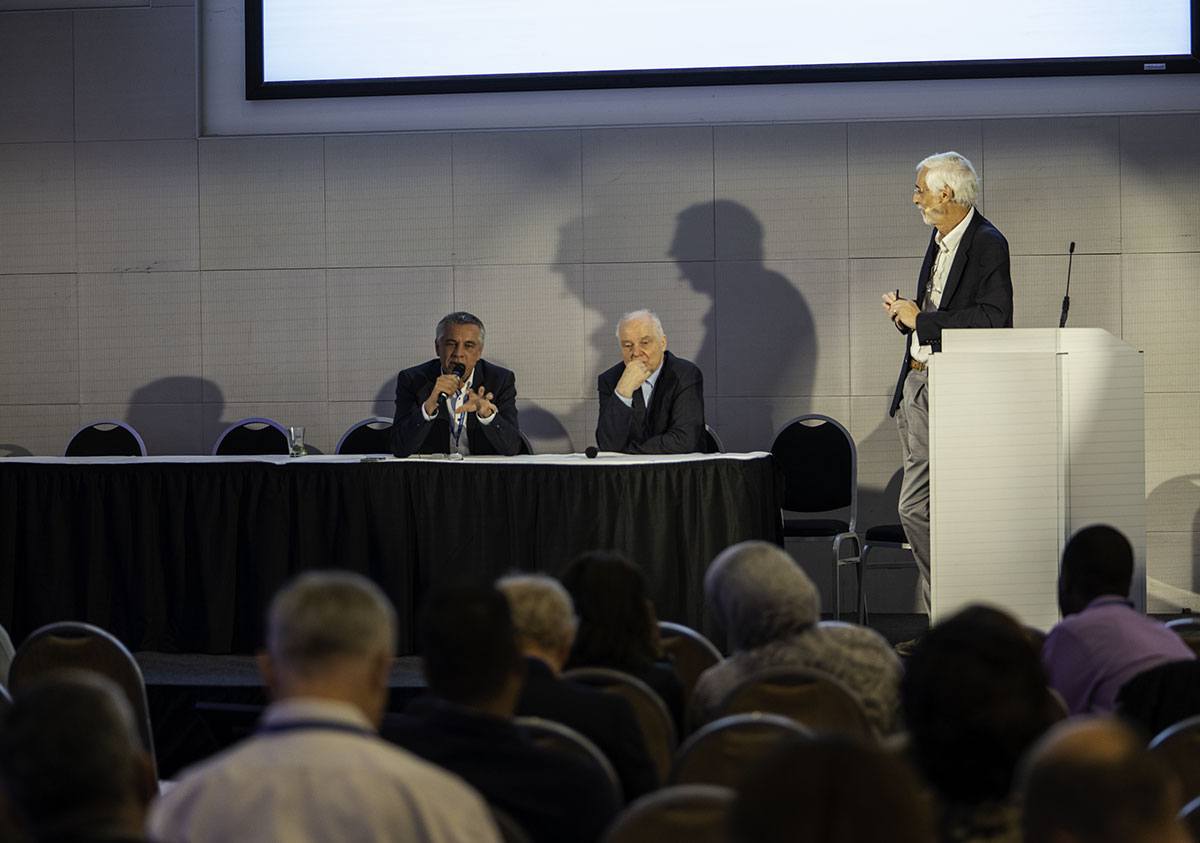Co-Chair Prof. Bruce Zuraw (US HAEA Angioedema Center at the University of California – San Diego, United States) welcomed delegates to the Scientific Session on behalf of the HAEi Scientific Program Committee. He then presented three hypothetical clinical cases, asking the audience to vote on what they would do based on the information provided. This promoted lively discussion and highlighted that there is often no single answer on what to do next.
In the first of two scientific abstract sessions, Co-Chair Prof. Konrad Bork (University Medical Center in Mainz, Germany) outlined that the morning would be dedicated to ‘Improving Diagnosis and Management of HAE’. The data exchange was opened with a plenary presentation by Dr. Alberto López-Lera (Hospital Universitario La Paz, Madrid, Spain), which provided an overview of progress in HAE, new observations, and mechanisms since we were last able to meet four years ago.
The next session featured a series of oral abstracts.
The first oral presentation by Dr. Emel Aygören-Pürsün (University Hospital Frankfurt, Germany) was: ‘Comorbid Cardiovascular Risk Factors During Danazol Long-Term Prophylaxis in Patients With HAE-C1-INH’. She concluded that HAE patients who had used danazol to manage their condition were more likely to have the conditions diabetes, hypertension, or abnormal levels of blood fats than those who had never used danazol. She felt this may indicate that danazol could increase the risk of developing conditions affecting the heart or blood vessels.
Following Dr. Aygören-Pürsün, Dr. Noémi Andrási (Semmelweis University, Budapest, Hungary) spoke to her research: ‘Focusing on Children – Treating C1-Inhibitor Deficiency in Childhood’. She concluded that in childhood, early diagnosis is essential and acute treatment is usually enough to allow for a reasonable quality of life. However, in some cases, long or short-term preventative therapy may be needed. Regular follow-up is essential, she told delegates, as the course of the disease can change from year-to-year. Dr. Andrási was the recipient of the second Young Researcher/Investigator Award.
>> View abstract: Focussing on children – treating C1-inhibitor deficiency in childhood
Dr. Suprit Basu (Postgraduate Institute of Medical Education and Research, Chandigarh, India) presented via video on: ‘Clinical Profile of Hereditary Angioedema: Our Experience over 26 Years in North India’. His research, in the largest groups of HAE patients in India, showed that, on average, there is an 11-year delay before patients receive a diagnosis of HAE. Further patient awareness efforts are vital, alongside increased testing facilities and availability of first-line medications for HAE in India.
Closing the session, Prof. Markus Magerl (Charité – Universitätsmedizin Berlin, Germany, and Fraunhofer Translational Medicine and Pharmacology ITMP, Germany) spoke to his abstract: ‘Real-World Effectiveness and Disease Management in European Patients with HAE on Long-term Prophylaxis with Lanadelumab’. He informed delegates that an interim analysis had shown that in real-world practice, healthcare professionals could increase the time between when doses of lanadelumab were given to patients while maintaining attack-free rates. The full analysis is eagerly anticipated.
After the Scientific Poster Session, the afternoon was dedicated to ‘Normalizing HAE Patients’ Lives’. The session was opened with a short welcome back by Co-Chair Prof. Marcus Maurer (Charité – Universitätsmedizin Berlin, Germany), introducing Dr. Paula Busse (Mount Sinai Hospital, New York, United States) to give the first oral presentation.
Dr. Busse presented her abstract via video: ‘The Global and Regional Impact of Hereditary Angioedema (HAE) Attacks on Mental Health, Activities of Daily Living and Quality of Life’. The focus group and survey results reiterated HAE attacks’ impact on people’s daily lives, mental health, and overall quality of life; almost half the time, people with HAE felt ‘less than their 100% self’ because of their HAE.
Speaking next was Dr. Ankur Kumar Jindal (Postgraduate Institute of Medical Education and Research, Chandigarh, India), on his research: ‘Quality of Life in Patients with Hereditary Angioedema Correlates with Angioedema Control: Our Experience at Chandigarh, North India’. Presenting the first study to report on the quality of life for HAE patients in India, Dr. Kumar indicated that two-thirds of patients have a poor quality of life. The frequency of attacks (level of angioedema control) isn’t the only factor affecting patient quality of life. The authors call for appropriate psychosocial support for patients and access and availability of first-line treatment options.
Finally, Dr. Teresa Caballero (Hospital Universitario La Paz, Madrid, Spain) spoke to her abstract entitled: ‘Surveys on Access to Modern Medicines for Hereditary Angioedema (HAE)’. The results from a survey of people with HAE and also a survey of healthcare professionals were presented. Dr. Caballero presented data indicating that most patients felt they could not lead a totally normal life due to HAE. Most hospitals in Spain lacked access to innovative drugs for long-term prophylaxis, and 40% of hospitals surveyed could not offer patients self-administration programs. The authors have used the results to prepare recommendations and actions to help improve healthcare provision for HAE patients.
>> View abstract: Surveys on Access to Modern Medicines for Hereditary Angioedema (HAE)
The session was closed with a series of plenary presentations. Sadly, Prof. Vesna Grivcheva-Panovska (University of St. Cyril and Methodius, Skopje, North Macedonia) could not attend the meeting, and Prof. Maurer gave the talk entitled ‘Individualizing Care for Optimal Outcomes’. Associate Prof. Jonny Peter (University of Cape Town, South Africa) provided a South African perspective on HAE management. HAEi Board of Directors member and HAE UK Executive Officer Rachel Annals presented ways to engage the hard-to-reach patient, which may help improve patient engagement in their care.
The day was brought to a close with a Question-and-Answer session for the HAEi Scientific Program Committee.











